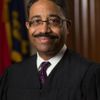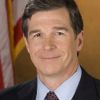Governor of North Carolina
 From Ballotpedia - Reading time: 27 min
From Ballotpedia - Reading time: 27 min
| North Carolina Governor | |
 | |
| General information | |
| Office Type: | Partisan |
| Office website: | Official Link |
| Compensation: | $165,750 |
| 2025 FY Budget: | $6,771,035 |
| Term limits: | Two consecutive terms |
| Structure | |
| Length of term: | 4 years |
| Authority: | North Carolina Constitution, Article III, Section I |
| Selection Method: | Elected |
| Current Officeholder | |
Governor of North Carolina
Roy Cooper | |
| Elections | |
| Next election: | November 5, 2024 |
| Last election: | November 3, 2020 |
| Other North Carolina Executive Offices | |
| Governor • Lieutenant Governor • Secretary of State • Attorney General • Treasurer • Auditor • Superintendent of Education • Agriculture Commissioner • Insurance Commissioner • Natural Resources Commissioner • Labor Commissioner • Public Service Commission | |
The Governor of the State of North Carolina is an elected constitutional officer, the head of the executive branch and the highest state office in North Carolina. The governor is popularly elected every four years by a plurality and is limited to two consecutive terms.[1]
North Carolina has a divided government where neither party holds a trifecta. The Democratic Party controls the office of governor, while the Republican Party controls both chambers of the state legislature.
North Carolina has a Democratic triplex. The Democratic Party controls the offices of governor, secretary of state, and attorney general.
Current officer[edit]
The 75th and current governor is Roy Cooper (D).[2] Cooper defeated Pat McCrory (R) in the general election on November 8, 2016. He assumed office on January 1, 2017.[3]
Authority[edit]
The state Constitution addresses the office of the governor in Article III, the Executive Department.
Under Article III, Section I:
|
The executive power of the State shall be vested in the Governor.[1] |
Qualifications[edit]
| State Executives |
|---|
| Current Governors |
| Gubernatorial Elections |
| 2024 • 2023 • 2022 • 2021 • 2020 • 2019 • 2018 • 2017 • 2016 • 2015 • 2014 |
| Current Lt. Governors |
| Lt. Governor Elections |
| 2024 • 2023 • 2022 • 2021 • 2020 • 2019 • 2018 • 2017 • 2016 • 2015 • 2014 |
Candidates for the office of the governor must be:
- at least 30 years old
- a citizen of the United States for at least five years
- a resident of North Carolina for at least two years
Additionally, no governor-elect may take office until he or she has taken an oath before the chief justice of the North Carolina Supreme Court.[1]
Vacancies[edit]
- See also: How gubernatorial vacancies are filled
Details of vacancies are addressed under Article III, Section 3.
The lieutenant Governor-elect takes office as the governor if the governor-elect fails to qualify. The lieutenant governor also takes over as governor any time the sitting governor dies, resigns, or is removed from office.
If the governor is absent or unable to discharge the office due to mental or physical illness, the lieutenant governor becomes the acting governor.
If the governor wishes to declare his or her temporary or permanent inability to discharge the office, he or she does so in writing, making a declaration to the attorney general. The governor may also resume the office by making a similar written declaration to the attorney general.
The General Assembly of North Carolina may take a vote and declare, by a two-thirds majority of both chambers, that the governor is unfit for the office by reason of mental incapacity. The legislature shall then give the governor notice and hear the case before a joint session. When the legislature is in recess, the General Council may convene for the same purpose and follow the same procedure.
Removing the governor from office for any other reason must be done as an impeachment.
Duties[edit]
Excepting the governor's use of the State Seal of North Carolina and the gubernatorial power to make vacancy appointments, all constitutional duties are laid out in Article III, Section 5.
The governor heads the Council of State. The governor is responsible for preparing and presenting the state budget to the General Assembly of North Carolina. Additionally, the governor of North Carolina has extensive powers of appointment of executive branch officials, some judges, and members of boards and commissions. The governor serves as commander-in-chief of the state military forces except in cases when they are deployed by the federal government.
Other duties and privileges of the office include:
- Residing at the official residence of the Governor
- Making a periodic address to the state legislature concerning the state of North Carolina and giving recommendations to the legislature
- Regularly monitoring the state budget to ensure that principal and interest on bonds and notes are paid promptly, and "effect[ing] the necessary economies" if revenue will not be sufficient to meet expenditures
- Granting "reprieves, commutations, and pardons," not including convictions for impeachment
- Convening extraordinary sessions of the state legislature
- Appointing all offices "not otherwise provided for" subject to the approval of the Senate
- Requiring written information from the head of any administrative department or office on the state of the office
- Reorganizing the executive branch by making "such changes in the allocation of offices and agencies and in the allocation of those functions, powers, and duties as he considers necessary for efficient administration"
- Reconvening the regular session of the General Assembly, not more than 40 days after sine die, for the sole purpose of reconsidering bills vetoed by the Governor
- Keeping and using "The Great Seal of the State of North Carolina" and signing all commissions granted by the state of North Carolina (§ 10)
- Making vacancy appointments to all other executive offices established by the constitution, including interim appointments[1]
Elections[edit]
North Carolina elects governors in the presidential elections, that is, in leap years. For North Carolina, 2020, 2024, 2028, and 2032 are all gubernatorial election years. Legally, the gubernatorial inauguration is always set for the first day in the January following an election.[1]
2024[edit]
General election
General election for Governor of North Carolina
Josh Stein, Mark K. Robinson, Vinny Smith, Wayne Turner, and Mike Ross are running in the general election for Governor of North Carolina on November 5, 2024.
Candidate | ||
 | Josh Stein (D)  | |
 | Mark K. Robinson (R) | |
 | Vinny Smith (Constitution Party) | |
 | Wayne Turner (G)  | |
 | Mike Ross (L) | |
 = candidate completed the Ballotpedia Candidate Connection survey. = candidate completed the Ballotpedia Candidate Connection survey. | ||||
| If you are a candidate and would like to tell readers and voters more about why they should vote for you, complete the Ballotpedia Candidate Connection Survey. | ||||
Do you want a spreadsheet of this type of data? Contact our sales team. | ||||
Democratic primary election
Democratic primary for Governor of North Carolina
Josh Stein defeated Michael R. Morgan, Chrelle Booker, Marcus Williams, and Gary Foxx in the Democratic primary for Governor of North Carolina on March 5, 2024.
Candidate | % | Votes | ||
| ✔ |  | Josh Stein  | 69.6 | 479,026 |
 | Michael R. Morgan | 14.3 | 98,627 | |
 | Chrelle Booker | 6.7 | 46,045 | |
 | Marcus Williams | 5.7 | 39,257 | |
 | Gary Foxx | 3.7 | 25,283 | |
| Total votes: 688,238 | ||||
 = candidate completed the Ballotpedia Candidate Connection survey. = candidate completed the Ballotpedia Candidate Connection survey. | ||||
| If you are a candidate and would like to tell readers and voters more about why they should vote for you, complete the Ballotpedia Candidate Connection Survey. | ||||
Do you want a spreadsheet of this type of data? Contact our sales team. | ||||
Republican primary election
Republican primary for Governor of North Carolina
Mark K. Robinson defeated Dale Folwell and Bill Graham in the Republican primary for Governor of North Carolina on March 5, 2024.
Candidate | % | Votes | ||
| ✔ |  | Mark K. Robinson | 64.8 | 666,504 |
 | Dale Folwell | 19.2 | 196,955 | |
 | Bill Graham | 16.0 | 164,572 | |
| Total votes: 1,028,031 | ||||
 = candidate completed the Ballotpedia Candidate Connection survey. = candidate completed the Ballotpedia Candidate Connection survey. | ||||
| If you are a candidate and would like to tell readers and voters more about why they should vote for you, complete the Ballotpedia Candidate Connection Survey. | ||||
Do you want a spreadsheet of this type of data? Contact our sales team. | ||||
Withdrawn or disqualified candidates
- Andy Wells (R)
- Mark Walker (R)
- Jesse Thomas (R)
Green primary election
The Green primary election was canceled. Wayne Turner advanced from the Green primary for Governor of North Carolina.
Libertarian primary election
Libertarian primary for Governor of North Carolina
Mike Ross defeated Shannon Bray in the Libertarian primary for Governor of North Carolina on March 5, 2024.
Candidate | % | Votes | ||
| ✔ |  | Mike Ross | 59.4 | 2,910 |
 | Shannon Bray | 40.6 | 1,985 | |
| Total votes: 4,895 | ||||
 = candidate completed the Ballotpedia Candidate Connection survey. = candidate completed the Ballotpedia Candidate Connection survey. | ||||
| If you are a candidate and would like to tell readers and voters more about why they should vote for you, complete the Ballotpedia Candidate Connection Survey. | ||||
Do you want a spreadsheet of this type of data? Contact our sales team. | ||||
2020[edit]
General election
General election for Governor of North Carolina
Incumbent Roy Cooper defeated Dan Forest, Steven DiFiore II, and Al Pisano in the general election for Governor of North Carolina on November 3, 2020.
Candidate | % | Votes | ||
| ✔ |  | Roy Cooper (D) | 51.5 | 2,834,790 |
 | Dan Forest (R) | 47.0 | 2,586,605 | |
 | Steven DiFiore II (L)  | 1.1 | 60,449 | |
 | Al Pisano (Constitution Party)  | 0.4 | 20,934 | |
| Total votes: 5,502,778 | ||||
 = candidate completed the Ballotpedia Candidate Connection survey. = candidate completed the Ballotpedia Candidate Connection survey. | ||||
| If you are a candidate and would like to tell readers and voters more about why they should vote for you, complete the Ballotpedia Candidate Connection Survey. | ||||
Do you want a spreadsheet of this type of data? Contact our sales team. | ||||
Democratic primary election
Democratic primary for Governor of North Carolina
Incumbent Roy Cooper defeated Ernest Reeves in the Democratic primary for Governor of North Carolina on March 3, 2020.
Candidate | % | Votes | ||
| ✔ |  | Roy Cooper | 87.2 | 1,128,829 |
 | Ernest Reeves | 12.8 | 165,804 | |
| Total votes: 1,294,633 | ||||
 = candidate completed the Ballotpedia Candidate Connection survey. = candidate completed the Ballotpedia Candidate Connection survey. | ||||
| If you are a candidate and would like to tell readers and voters more about why they should vote for you, complete the Ballotpedia Candidate Connection Survey. | ||||
Do you want a spreadsheet of this type of data? Contact our sales team. | ||||
Republican primary election
Republican primary for Governor of North Carolina
Dan Forest defeated Holly Grange in the Republican primary for Governor of North Carolina on March 3, 2020.
Candidate | % | Votes | ||
| ✔ |  | Dan Forest | 89.0 | 698,077 |
 | Holly Grange | 11.0 | 86,714 | |
| Total votes: 784,791 | ||||
 = candidate completed the Ballotpedia Candidate Connection survey. = candidate completed the Ballotpedia Candidate Connection survey. | ||||
| If you are a candidate and would like to tell readers and voters more about why they should vote for you, complete the Ballotpedia Candidate Connection Survey. | ||||
Do you want a spreadsheet of this type of data? Contact our sales team. | ||||
2016[edit]
The general election for governor was held on November 8, 2016.
Roy Cooper defeated incumbent Pat McCrory and Lon Cecil in the North Carolina governor election.
| North Carolina Governor, 2016 | ||||
|---|---|---|---|---|
| Party | Candidate | Vote % | Votes | |
| Democratic | 49.02% | 2,309,190 | ||
| Republican | Pat McCrory Incumbent | 48.80% | 2,298,927 | |
| Libertarian | Lon Cecil | 2.19% | 102,986 | |
| Total Votes | 4,711,103 | |||
| Source: North Carolina Secretary of State | ||||
Term limits[edit]
- See also: States with gubernatorial term limits
North Carolina governors are restricted to two consecutive terms in office, after which they must wait one term before being eligible to run again.
North Carolina Constitution, Article III, Section 2, Paragraph 2
| No person elected to the office of Governor ... shall be eligible for election to more than two consecutive terms of the same office.[1] |
Partisan composition[edit]
The chart below shows the partisan breakdown of North Carolina governors from 1992 to 2013.
Full history[edit]
To view the electoral history dating back to 2000 for the office of Governor of North Carolina, click [show] to expand the section. | |||||||||||||||||||||||||||||||||||||||||||||||||||||||||||||||||||||||||||||||||||||||||||||||||||||||||||||||||||||||||||||||||||||||||||||||||||||||
|---|---|---|---|---|---|---|---|---|---|---|---|---|---|---|---|---|---|---|---|---|---|---|---|---|---|---|---|---|---|---|---|---|---|---|---|---|---|---|---|---|---|---|---|---|---|---|---|---|---|---|---|---|---|---|---|---|---|---|---|---|---|---|---|---|---|---|---|---|---|---|---|---|---|---|---|---|---|---|---|---|---|---|---|---|---|---|---|---|---|---|---|---|---|---|---|---|---|---|---|---|---|---|---|---|---|---|---|---|---|---|---|---|---|---|---|---|---|---|---|---|---|---|---|---|---|---|---|---|---|---|---|---|---|---|---|---|---|---|---|---|---|---|---|---|---|---|---|---|---|---|---|
2012Bev Perdue (D) did not run for re-election. Pat McCrory (R) defeated Walter Dalton (D) in the November 6, 2012 general election.
2008On November 4, 2008, Bev Perdue won election to the office of Governor of North Carolina. She defeated Pat McCrory and Michael Munger in the general election.
2004 On November 2, 2004, Mike Easley won re-election to the office of Governor of North Carolina. He defeated Patrick Ballantine and Barbara Howe in the general election.
2000 On November 7, 2000, Mike Easley won election to the office of Governor of North Carolina. He defeated Richard Vinroot, Barbara Howe and Douglas Schell in the general election.
| |||||||||||||||||||||||||||||||||||||||||||||||||||||||||||||||||||||||||||||||||||||||||||||||||||||||||||||||||||||||||||||||||||||||||||||||||||||||
Fact checks[edit]
| Fact check/Did recent bills limit North Carolina's gubernatorial powers? January 27, 2017 | |
| A Huffington Post article on North Carolina's legislative battles claimed that recently passed bills "drastically limit [Democratic Gov. Roy] Cooper’s ability to make appointments to various state boards and departments." Did recent bills "drastically limit" Gov. Cooper’s ability to make state board and department appointments? Read Ballotpedia's fact check » | |
Divisions[edit]
Note: Ballotpedia's state executive officials project researches state official websites for information that describes the divisions (if any exist) of a state executive office. That information for the Governor of North Carolina has not yet been added. After extensive research we were unable to identify any relevant information on state official websites. If you have any additional information about this office for inclusion on this section and/or page, please email us.
State budget[edit]
Role in state budget[edit]
- See also: North Carolina state budget and finances
The state operates on a biennial budget cycle. The sequence of key events in the budget process is as follows:[4]
- Budget instructions are sent to state agencies in October.
- State agency budget requests are submitted in December.
- The governor submits his or her proposed budget to the North Carolina State Legislature in March.
- The legislature adopts a budget between June and August. A simple majority is required to pass a budget.
- The biennial budget cycle begins in July.
North Carolina is one of six states in which the governor cannot exercise line item veto authority.[4][5]
The governor is constitutionally and statutorily required to submit a balanced budget. Likewise, the legislature is constitutionally and statutorily required to pass a balanced budget.[4]
Governor's office budget[edit]
The budget for the governor's office in Fiscal Year 2025 was $6,771,035.[6]
Compensation[edit]
The governor, along with the rest of North Carolina's elected executives, is entitled to a fixed salary in accordance with Article III, Section 9 of the North Carolina Constitution:
| The officers whose offices are established by this Article shall at stated periods receive the compensation and allowances prescribed by law, which shall not be diminished during the time for which they have been chosen.[1] |
2022[edit]
In 2022, the officer's salary was $165,750, according to the Council of State Governments.[7]
2021[edit]
In 2021, the governor received a salary of $154,743, according to the Council of State Governments.[8]
2020[edit]
In 2020, the governor received a salary of $150,969, according to the Council of State Governments.[9]
2019[edit]
In 2019, the governor received a salary of $144,349, according to the Council of State Governments.[10]
2018[edit]
In 2018, the governor received a salary of $144,349, according to the Council of State Governments.[11]
2017[edit]
In 2017, the governor received a salary of $144,349, according to the Council of State Governments.[12]
2016[edit]
In 2016, the governor received a salary of $142,265, according to the Council of State Governments.[13]
2015[edit]
In 2015, the governor's salary was increased to $142,265, according to the Council of State Governments.[14]
2014[edit]
In 2014, the governor received a salary of $141,265, according to the Council of State Governments.[15]
2013[edit]
In 2013, the governor's salary was increased to $141,265.[16]
2010[edit]
In 2010, the governor was paid $139,590 a year, the 20th highest gubernatorial salary in America.[17]
Historical officeholders[edit]
There have been 75 governors of North Carolina since 1776. Of the 75 officeholders, 39 were Democratic, 12 Democratic-Republican, eight Republican, five Federalists, five Whigs, four with no party, and two Anti-Federalists.[18]
| List of officeholders from 1776-present | |||||
|---|---|---|---|---|---|
| # | Name | Tenure | Party | ||
| 1 | Richard Caswell | 1776 - 1780 | No Party | ||
| 2 | Abner Nash | 1780 - 1781 | No Party | ||
| 3 | Thomas Burke | 1781 - 1782 | No Party | ||
| 4 | Alexander Martin | 1782 - 1785 | Federalist | ||
| 5 | Richard Caswell | 1785 – 1787 | No Party | ||
| 6 | Samuel Johnston | 1787 - 1789 | Federalist | ||
| 7 | Alexander Martin | 1789 – 1792 | Federalist | ||
| 8 | Richard Dobbs Spaight | 1792 - 1795 | Anti-Federalist | ||
| 9 | Samuel Ashe | 1795 - 1798 | Anti-Federalist | ||
| 10 | William Richardson Davie | 1798 - 1799 | Federalist | ||
| 11 | Benjamin Williams | 1799 - 1802 | Democratic-Republican | ||
| 12 | James Turner | 1802 - 1805 | Democratic-Republican | ||
| 13 | Nathaniel Alexander | 1805 - 1807 | Democratic-Republican | ||
| 14 | Benjamin Williams | 1807 – 1808 | Democratic-Republican | ||
| 15 | David Stone | 1808 - 1810 | Democratic-Republican | ||
| 16 | Benjamin Smith | 1810 - 1811 | Democratic-Republican | ||
| 17 | William Hawkins | 1811 - 1814 | Democratic-Republican | ||
| 18 | William Miller | 1814 - 1817 | Democratic-Republican | ||
| 19 | John Branch | 1817 - 1820 | Democratic-Republican | ||
| 20 | Jesse Franklin | 1820 - 1821 | Democratic-Republican | ||
| 21 | Gabriel Holmes | 1821 - 1824 | Democratic-Republican | ||
| 22 | Hutchins Gordon Burton | 1824 - 1827 | Federalist | ||
| 23 | James Iredell | 1827 - 1828 | Democratic-Republican | ||
| 24 | John Owen | 1828 - 1830 | |||
| 25 | Montfort Stokes | 1830 - 1832 | |||
| 26 | David Lowry Swain | 1832 - 1835 | Whig | ||
| 27 | Richard Dobbs Spaight | 1835 - 1836 | |||
| 28 | Edward Bishop Dudley | 1836 - 1841 | Whig | ||
| 29 | John Motley Morehead | 1841 - 1845 | Whig | ||
| 30 | William Alexander Graham | 1845 - 1849 | Whig | ||
| 31 | Charles Manly | 1849 - 1850 | Whig | ||
| 32 | David Settle Reid | 1851 - 1854 | |||
| 33 | Warren Winslow | 1854 - 1855 | |||
| 34 | Thomas Bragg | 1855 - 1859 | |||
| 35 | John Willis Ellis | 1859 - 1861 | |||
| 36 | Henry Toole Clark | 1861 - 1862 | |||
| 37 | Zebulon Baird Vance | 1862 - 1865 | |||
| 38 | William Woods Holden | 1865 - 1865 | |||
| 39 | Jonathan Worth | 1865 - 1868 | |||
| 40 | William Woods Holden | 1868 – 1870 | |||
| 41 | Tod Robinson Caldwell | 1870 - 1874 | |||
| 42 | Curtis Hooks Brogden | 1874 - 1877 | |||
| 43 | Zebulon Baird Vance | 1877 – 1879 | |||
| 44 | Thomas Jordan Jarvis | 1879 - 1885 | |||
| 45 | Alfred Moore Scales | 1885 - 1889 | |||
| 46 | Daniel Gould Fowle | 1889 - 1891 | |||
| 47 | Thomas Michael Holt | 1891 - 1893 | |||
| 48 | Elias Carr | 1893 - 1897 | |||
| 49 | Daniel Lindsay Russell | 1897 - 1901 | |||
| 50 | Charles Brantley Aycock | 1901 - 1905 | |||
| 51 | Robert Broadnax Glenn | 1905 - 1909 | |||
| 52 | William Walton Kitchin | 1909 - 1913 | |||
| 53 | Locke Craig | 1913 - 1917 | |||
| 54 | Thomas Walter Bickett | 1917 - 1921 | |||
| 55 | Cameron A. Morrison | 1921 - 1925 | |||
| 56 | Angus Wilton Mclean | 1925 - 1929 | |||
| 57 | Oliver Max Gardner | 1929 - 1933 | |||
| 58 | John Christopher Blucher Ehringhaus | 1933 - 1937 | |||
| 59 | Clyde Roark Hoey | 1937 - 1941 | |||
| 60 | Joseph Melville Broughton | 1941 - 1945 | |||
| 61 | Robert Gregg Cherry | 1945 - 1949 | |||
| 62 | William Kerr Scott | 1949 - 1953 | |||
| 63 | William Bradley Umstead | 1953 - 1954 | |||
| 64 | Luther Hartwell Hodges | 1954 - 1961 | |||
| 65 | James Terry Sanford | 1961 - 1965 | |||
| 66 | Dan Killian Moore | 1965 - 1969 | |||
| 67 | Robert Walter Scott | 1969 - 1973 | |||
| 68 | James E. Holshouser | 1973 - 1977 | |||
| 69 | James B. Hunt | 1977 - 1985 | |||
| 70 | James G Martin | 1985 - 1993 | |||
| 71 | James B. Hunt | 1993 – 2001 | |||
| 72 | Michael F. Easley | 2001 - 2009 | |||
| 73 | Bev Perdue | 2009 - 2013 | |||
| 74 | Pat McCrory | 2013 – 2017 | |||
| 75 | Roy Cooper | 2017 – present | |||
History[edit]
Partisan balance 1992-2013[edit]
From 1992 to 2013 in North Carolina, there were Democratic governors in office for 20 years, while there were Republican governors in office the two years, including the final year (2013). North Carolina is one of seven states that were run by a Democratic governor for more than 80 percent of the years between 1992 and 2013. North Carolina was under a Republican trifecta for the final year of the study period.
Across the country, there were 493 years of Democratic governors (44.82%) and 586 years of Republican governors (53.27%) from 1992 to 2013.
Over the course of the 22-year study, state governments became increasingly more partisan. At the outset of the study period (1992), 18 of the 49 states with partisan legislatures had single-party trifectas and 31 states had divided governments. In 2013, only 13 states had divided governments, while single-party trifectas held sway in 36 states, the most in the 22 years studied.
The chart below shows the partisan composition of the Office of the Governor of North Carolina, the North Carolina State Senate and the North Carolina House of Representatives from 1992 to 2013.
SQLI and Partisanship[edit]
The chart below depicts the partisanship of the North Carolina state government and the State Quality of Life Index (SQLI) ranking for the years studied. For the SQLI, the states were ranked from 1-50, with 1 being the best and 50 the worst. During the years of the study, North Carolina experienced many years under a Democratic trifecta, from 1993 to 1994 and from 1999 to 2010. In 2013, however, this trend switched, and the state experienced a Republican trifecta instead. North Carolina's SQLI rating was in the 30s for most of the years of the study, with its lowest ranking in 2003, finishing 41st. However, in more recent years of the study, the state's ranking improved. Its highest ranking was 11th in 2011 during a divided government.
- SQLI average with Democratic trifecta: 30.08
- SQLI average with Republican trifecta: N/A
- SQLI average with divided government: 30.89
Noteworthy events[edit]
Conflicts between Gov. Roy Cooper and the General Assembly of North Carolina[edit]
The 2016 election changed the political landscape of North Carolina. Before the election, Republicans held a state government trifecta, meaning they controlled the governor's office and both chambers of the legislature. As a result of the 2016 election, however, Democrats took control of the governor's office, while Republicans held a 35-15 majority in the Senate and a 74-46 majority in the House, giving them the three-fifths majority needed in each chamber to override gubernatorial vetoes. In losing the 2016 election, incumbent Gov. Pat McCrory (R) became the first North Carolina governor in North Carolina history to lose in a bid for re-election. He was defeated by North Carolina Attorney General Roy Cooper (D) by 10,263 votes. McCrory did not concede the race until almost a month after the election. He requested a recount since unofficial vote totals had him within 10,000 votes of Cooper.[19]
Following McCrory's concession, conflicts began to emerge between Cooper and the General Assembly of North Carolina. Before Cooper (D) was sworn in, the Republican-controlled legislature began passing legislation that Democrats argued was intended to curtail the governor's power. Legislation included efforts to restructure the state board of elections, to require Senate approval of cabinet-level appointments, and to decrease the number of governor-appointed judges on the North Carolina Court of Appeals. Senate Minority Leader Dan Blue (D) said of the legislation, "What we’re dealing with is a political disaster. Let’s deal with the reality: It’s a power grab. If McCrory had won the election, we wouldn’t be here now, reducing the number of positions he has control over."[20] Cooper said that the legislation had been "unconstitutional and anything but bipartisan."[21]
Republicans maintained that the legislation had been discussed for years and that it was returning power to the legislature that was taken away by Democrats years before.[22] Sen. Chad Barefoot (R) said the legislation returned "power that was grabbed during Democratic administrations in the 1990s, and some in the '70s."[23] Republican Rep. David Lewis said of the legislation, "I think, to be candid with you, that you will see the General Assembly look to reassert its constitutional authority in areas that may have been previously delegated to the executive branch."[24]
| Fact checks: | |
|---|---|
| • Did recent bills limit North Carolina's gubernatorial powers? | |
| • Did the North Carolina legislature eliminate state supreme court oversight of the General Assembly? | |
The following timeline details some of the conflicts between Gov. Roy Cooper (D) and the General Assembly of North Carolina during Cooper's first two years in office. Some legislation highlighted in the timeline are bills that Cooper said were intended to undermine his authority as governor.
| |||||||||||||||||||||||||||||||||||||||||||||||||||||||||||||||||||||||||||||||||||||||||||||
State profile[edit]
| Demographic data for North Carolina | ||
|---|---|---|
| North Carolina | U.S. | |
| Total population: | 10,035,186 | 316,515,021 |
| Land area (sq mi): | 48,618 | 3,531,905 |
| Race and ethnicity** | ||
| White: | 69.5% | 73.6% |
| Black/African American: | 21.5% | 12.6% |
| Asian: | 2.5% | 5.1% |
| Native American: | 1.2% | 0.8% |
| Pacific Islander: | 0.1% | 0.2% |
| Two or more: | 2.4% | 3% |
| Hispanic/Latino: | 8.8% | 17.1% |
| Education | ||
| High school graduation rate: | 85.8% | 86.7% |
| College graduation rate: | 28.4% | 29.8% |
| Income | ||
| Median household income: | $46,868 | $53,889 |
| Persons below poverty level: | 20.5% | 11.3% |
| Source: U.S. Census Bureau, "American Community Survey" (5-year estimates 2010-2015) Click here for more information on the 2020 census and here for more on its impact on the redistricting process in North Carolina. **Note: Percentages for race and ethnicity may add up to more than 100 percent because respondents may report more than one race and the Hispanic/Latino ethnicity may be selected in conjunction with any race. Read more about race and ethnicity in the census here. | ||
Presidential voting pattern[edit]
North Carolina voted Republican in five out of the six presidential elections between 2000 and 2020.
Pivot Counties (2016)
Ballotpedia identified 206 counties that voted for Donald Trump (R) in 2016 after voting for Barack Obama (D) in 2008 and 2012. Collectively, Trump won these Pivot Counties by more than 580,000 votes. Of these 206 counties, six are located in North Carolina, accounting for 2.91 percent of the total pivot counties.[26]
Pivot Counties (2020)
In 2020, Ballotpedia re-examined the 206 Pivot Counties to view their voting patterns following that year's presidential election. Ballotpedia defined those won by Trump won as Retained Pivot Counties and those won by Joe Biden (D) as Boomerang Pivot Counties. Nationwide, there were 181 Retained Pivot Counties and 25 Boomerang Pivot Counties. North Carolina had six Retained Pivot Counties, 3.31 percent of all Retained Pivot Counties.
More North Carolina coverage on Ballotpedia
- Elections in North Carolina
- United States congressional delegations from North Carolina
- Public policy in North Carolina
- Endorsers in North Carolina
- North Carolina fact checks
- More...
Contact information[edit]
Office of the Governor
20301 Mail Service Center
Raleigh, NC 27699-0301
Phone: (919) 814-2000
See also[edit]
| North Carolina | State Executive Elections | News and Analysis |
|---|---|---|
|
|
|
|
External links[edit]
Footnotes[edit]
- ↑ 1.0 1.1 1.2 1.3 1.4 1.5 1.6 "North Carolina State Constitution," accessed January 18, 2021
- ↑ NC Governor Roy Cooper, "Roy Cooper," accessed January 18, 2021
- ↑ ABC 11 News, "Roy Cooper sworn in as North Carolina governor," January 1, 2017
- ↑ 4.0 4.1 4.2 National Association of State Budget Officers, "Budget Processes in the States, Spring 2021," accessed January 24, 2023
- ↑ National Conference of State Legislatures, "Separation of Powers: Executive Veto Powers," accessed January 26, 2024
- ↑ North Carolina General Assembly, "House Bill 259," accessed December 6, 2023
- ↑ Council of State Governments, "Book of the States 2022 Table 4.11: Selected State Administrative Officials: Annual Salaries," provided to Ballotpedia by CSG personnel
- ↑ Issuu, "The Book of the States 2021," accessed September 28, 2022
- ↑ Council of State Governments, "Selected State Administrative Officials: Annual Salaries, 2020," accessed January 18, 2021
- ↑ Council of State Governments, "Selected State Administrative Officials: Annual Salaries, 2019," accessed January 18, 2021
- ↑ Council of State Governments, "Selected State Administrative Officials: Annual Salaries, 2018," accessed January 18, 2021
- ↑ Council of State Governments, "Selected State Administrative Officials: Annual Salaries, 2017," accessed January 18, 2021
- ↑ Council of State Governments, "Selected State Administrative Officials: Annual Salaries, 2016," accessed January 18, 2021
- ↑ Council of State Governments, "Selected State Administrative Officials: Annual Salaries," accessed January 18, 2021
- ↑ Council of State Governments, "Selected State Administrative Officials: Annual Salaries," accessed January 18, 2021
- ↑ Council of State Governments, "CSG Releases 2013 Governor Salaries," June 25, 2013
- ↑ Council of State Governments, "Selected State Administrative Officials: Annual Salaries," accessed January 18, 2021
- ↑ National Governors Association, "Former North Carolina Governors," accessed January 18, 2021
- ↑ Politico, "North Carolina governor alleges voter fraud in bid to hang on," November 21, 2016
- ↑ The Atlantic, "North Carolina's 'Legislative Coup' Is Over, and Republicans Won," December 16, 2016
- ↑ Twitter, "Roy Cooper," December 30, 2016
- ↑ USA Today, "GOP N.C. governor signs bill curbing Democrat successor's power," December 17, 2016
- ↑ NY Times, "North Carolina Governor Signs Law Limiting Successor’s Power," December 16, 2016
- ↑ CNN, "NC's GOP governor signs bill curbing successor's power," December 30, 2016
- ↑ The Hill, "NC governor vetoes bill allowing a new primary in disputed House race," December 21, 2018
- ↑ The raw data for this study was provided by Dave Leip of Atlas of U.S. Presidential Elections.
| ||||||||||||||||
| |||||||||||
 |
State of North Carolina Raleigh (capital) |
|---|---|
| Elections |
What's on my ballot? | Elections in 2024 | How to vote | How to run for office | Ballot measures |
| Government |
Who represents me? | U.S. President | U.S. Congress | Federal courts | State executives | State legislature | State and local courts | Counties | Cities | School districts | Public policy |
 KSF
KSF













